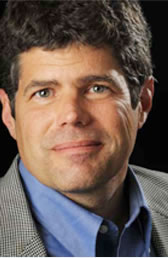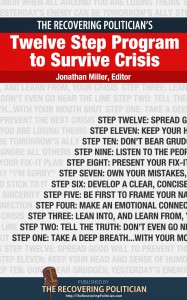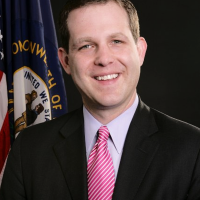Our first Featured Creative for our July theme of Interdependence is Jonathan Miller, former Kentucky State Treasurer and gubernatorial candidate, and now CEO of Second Act Strategies, a crisis management training firm. When I was consulting Jonathan as a client, I immediately identified his speech opening laugh line, The Recovering Politician, as a great premise for a community and was so excited to see his website become a hub for:”Insider Analysis of Today’s Scandals and Crises — and Tomorrow’s Second Acts.” As a very likeable guy with a rare passion for bi-partisan commentary, he managed to convince many career politicians from both sides of the aisle to be guest bloggers. Ultimately they became contributors to Miller’s book, The Recovering Politician’s Twelve Step Program to Survival Crisis and have become part of his Second Act Strategies team. Every day for the rest of this week you will get new daily teasers from each “step.” Hopefully no one reading will ever have to face the kind of mega-disasters the corporations they consult have to handle, but this is some good ammunition for coping in crisis–on any scale. Victoria C. Rowan, Ideasmyth’s Creatrix-in-Chief
STEP ONE: Take a Deep Breath…With Your Mouth Shut
By Jonathan Miller, former Kentucky State Treasurer
I was disappointed with myself. Like most successful politicians–like most successful leaders in any profession, I imagine–I’m a registered Type A control-freak. Whenever I find myself in the middle of a crisis, I’m driven instinctively to do something–anything–to outwork, outsmart, and out-strategize my adversaries.
And in this situation, with the personal stakes so high, I had failed. Miserably.
I knew intuitively that it was time for me to act–to take urgent, pinpointed, and exhaustive measures to restore my good name. I’d been trained, after all, in the white-hat arts of “rapid response” as a young staffer for Bill Clinton’s first presidential bid–the same campaign in which names like Carville and Begala and Stephanopolous became synonymous with a take-no-prisoners approach to crisis management.
I gathered my closest advisers to help me develop a public relations strategy to salvage my reputation. I proposed that I demand a meeting with the paper’s editorial board, or write a scathing op-ed, or perhaps even hold a press conference with my supportive wife.
But when I finally—fortunately—opened my ears, I heard the same, consistent counsel: Take a deep breath…with your mouth shut.
 Jonathan Miller, The Recovering Politician, has been elected twice as Kentucky State Treasurer; authored three books on faith, public policy and crisis management; graduated Phi Beta Kappa and with high honors from Harvard’s college and law school; practices as a crisis management attorney for Frost Brown Todd, a large regional law firm; serves as a Contributor to The Daily Beast and Kentucky Sports Radio, played straight man on The Daily Show with Jon Stewart; reached the final table in the World Series of Poker; and with his summer camp sweetheart, raised two remarkable college-going daughters.
Jonathan Miller, The Recovering Politician, has been elected twice as Kentucky State Treasurer; authored three books on faith, public policy and crisis management; graduated Phi Beta Kappa and with high honors from Harvard’s college and law school; practices as a crisis management attorney for Frost Brown Todd, a large regional law firm; serves as a Contributor to The Daily Beast and Kentucky Sports Radio, played straight man on The Daily Show with Jon Stewart; reached the final table in the World Series of Poker; and with his summer camp sweetheart, raised two remarkable college-going daughters.
STEP TWO: Tell the Truth: Don’t Go Near the Line
By Jeff Smith, former Missouri State Senator
The final stage of crisis management is often reparative–how do you repair your relationships with people you care about, how do you repair your public image, and perhaps prerequisite to the above, how do you repair yourself in a way that allows you to move on from crisis and humiliation to reinvent yourself in a way that stays true to the best of who you are?
I always find great irony–and sometimes a bit of tragedy–in the stories of disgraced pols who rush for immediate reinvention in the same ego-nurturing and soul-crushing arena that got them in trouble in the first place. It is as if the Mark Sanfords and Anthony Weiners of the world have determined that the artificial politico personas they have painstakingly created are indeed the only versions of themselves that they can still recognize. It seems they don’t understand that true redemption requires you to hit the pause button, to sublimate ambition and reflect on what truly matters.
Don’t get me wrong, prison was awful. But it forced me to pause and reflect, and thus gave me an advantage over the Sanfords and Weiners on the road to recovery. It helped me realize that the only way to ever shed my baggage would be to embrace the lessons my crisis taught me in my future roles a a teacher, a scholar, an advocate, a friend, and a husband.
 Jeff Smith is Assistant Professor of Politics and Advocacy at the New School. Jeff, who has taught political science at Washington University and Dartmouth College, teaches and researches political campaigns, urban political economy, policy advocacy, and the legislative process. Jeff served in the Missouri Senate from 2006-2009, representing inner-city St. Louis, where he co-founded a group of charter schools called the Confluence Academies. Trading Places, his Ph.D. thesis on U.S. partisan realignment from 1975-2004, was recently published as a book, and he is currently completing a book manuscript about the politics of prison reform. In addition to writing for political science journals, he is an advice columnist for New York political publication City and State, and frequently addresses audiences of public officials on ethics in politics. Jeff has appeared on CBS, CNN, MSNBC, and Current, and has been profiled by NPR’s This American Life, Harper’s, The New Republic, and other periodicals. He recently gave a TED talk on prison entrepreneurship, and has published op-ed pieces for CNN, The Atlantic, Inc., National Journal, Salon, Politico, New York Magazine, Buzzfeed, the Chicago Tribune, Chicago Sun-Times, Washington Examiner, and St. Louis Post-Dispatch. His youth-powered grass-roots congressional campaign was chronicled in the film Can Mr. Smith Get to Washington Anymore?, which was short-listed for an Academy Award.
Jeff Smith is Assistant Professor of Politics and Advocacy at the New School. Jeff, who has taught political science at Washington University and Dartmouth College, teaches and researches political campaigns, urban political economy, policy advocacy, and the legislative process. Jeff served in the Missouri Senate from 2006-2009, representing inner-city St. Louis, where he co-founded a group of charter schools called the Confluence Academies. Trading Places, his Ph.D. thesis on U.S. partisan realignment from 1975-2004, was recently published as a book, and he is currently completing a book manuscript about the politics of prison reform. In addition to writing for political science journals, he is an advice columnist for New York political publication City and State, and frequently addresses audiences of public officials on ethics in politics. Jeff has appeared on CBS, CNN, MSNBC, and Current, and has been profiled by NPR’s This American Life, Harper’s, The New Republic, and other periodicals. He recently gave a TED talk on prison entrepreneurship, and has published op-ed pieces for CNN, The Atlantic, Inc., National Journal, Salon, Politico, New York Magazine, Buzzfeed, the Chicago Tribune, Chicago Sun-Times, Washington Examiner, and St. Louis Post-Dispatch. His youth-powered grass-roots congressional campaign was chronicled in the film Can Mr. Smith Get to Washington Anymore?, which was short-listed for an Academy Award.
STEP THREE: Lean Into, and Learn from, Your Crisis
By John Y Brown, III, former Kentucky Secretary of State
To be clear, we are not talking here about the run of the mill setback–but rather, as my boss liked to call them, the spectacular setback. The kind of setback that can’t be hidden or ignored. That is a glorious failure that others (our competitors and detractors) are not only whispering about, but also discussing out loud (even though we struggle to admit that). The kind of failure that is so big that almost everyone around us has noticed and acknowledged it–and eventually, and finally, we have to admit and deal with it ourselves.
It’s sometimes when our best laid plans suddenly and unexpectedly implode. Or maybe we’ve been blind to the fact that for far too long we’ve been hoping against hope that something would work out that obviously isn’t going to. Or maybe we just “blew it;” through our own arrogance or vanity or irresponsibility, we failed ourselves.
What do we do when these sorts of crisis occur?
 In 1995 John Y Brown III was elected as Kentucky’s Secretary of State at the age of 32. Re-elected without opposition, he served a second term ending in 2003.Before entering politics, John headed up franchising for Roaster’s Inc., developing fast food venues in 37 states and several foreign countries. More recently, John served as vice-president of ResCare, working in government relations for the Louisville based human services company with over 40,000 employees in over 40 states and several foreign countries. He loves sharing his enthusiasm for business and law and served as an adjunct professor at Bellarmine University in Louisville. In 2007, John ran unsuccessfully as the lieutenant governor running mate on a ticket with gubernatorial candidate Jody Richards (Kentucky’s Speaker of the House) in a spirited seven slate Democratic primary.
In 1995 John Y Brown III was elected as Kentucky’s Secretary of State at the age of 32. Re-elected without opposition, he served a second term ending in 2003.Before entering politics, John headed up franchising for Roaster’s Inc., developing fast food venues in 37 states and several foreign countries. More recently, John served as vice-president of ResCare, working in government relations for the Louisville based human services company with over 40,000 employees in over 40 states and several foreign countries. He loves sharing his enthusiasm for business and law and served as an adjunct professor at Bellarmine University in Louisville. In 2007, John ran unsuccessfully as the lieutenant governor running mate on a ticket with gubernatorial candidate Jody Richards (Kentucky’s Speaker of the House) in a spirited seven slate Democratic primary.

Want to read more about Step One, Two, or Three? Purchase a copy of The Recovering Politician’s Twelve Step Program to Survival Crisishere.
See more of Jonathan’s Featured Creative posts on our Ideablog

